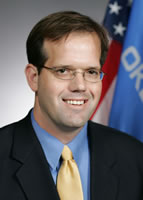In order to provide equal access and equal opportunity to people with diverse abilities, this site has been designed with accessibility in mind. Click here to view
Anderson calls on Governor to stop HealthChoice plan to send $75 million to New Jersey
 Sen. Patrick Anderson
Sen. Patrick Anderson
Beginning Jan. 1, 2012, Oklahoma school teachers and state employees using HealthChoice for insurance benefits will be forced to fill their prescriptions through an out-of-state mail order pharmacy, Sen. Patrick Anderson said Wednesday. The bureaucratic decision will result in the loss of approximately $75 million from the Oklahoma economy to New Jersey.
Anderson said the new prescription plan was not approved by the Governor or the legislature - instead it is the result of an agreement reached in August between a pharmaceutical company and the Oklahoma State and Education Employees Group Insurance Board (OSEEGIB). Lawmakers, teachers and state employees were given no notice of this proposed change or comparison of options – simply a pronouncement that the new plan would go into effect on January 1st.
“This plan is a great example of what we can expect under Obama-care,” said Anderson, R-Enid. “Under the new pharmacy plan, this state agency has dictated that you can no longer choose who you want to use as your pharmacist – you must instead use the company in New Jersey that the state agency has preselected for you. I have had several constituents contact me and complain about the fact that they do not want to have to call a 1-800 number in order to speak to a pharmacist. My constituents want to continue to use the local pharmacist that they know and who knows them.”
Anderson said the bureaucracy’s move is more than just a poor health care decision – it’s also bad economics. He said the plan would have a terrible economic impact on locally-owned pharmacies around the state.
“In many of the small communities that I represent the local school is the largest employer – and thus the largest customer base of the local pharmacy,” he said. “By telling these school teachers that they cannot use their local pharmacy, this plan eliminates the customer base of these local pharmacies and will force these pharmacies to lay off employees and possibly even close their doors. That, in turn, impacts the Oklahoma economy as a whole and it will be felt in more places than just local pharmacies. Removing $75 million from the Oklahoma economy will be felt in local restaurants, grocery stores and other retailers.”
Anderson explained OSEEGIB is a part of the Office of State Finance, an executive agency of the State of Oklahoma.
“For this reason I wrote Governor Fallin last week and asked that she intervene in this matter and stop this plan from going into effect,” he said. “I would urge all Oklahomans who are concerned about this prescription plan to contact the Governor’s office and let your voice be heard as well.”
 Oklahoma Senate
Oklahoma Senate

